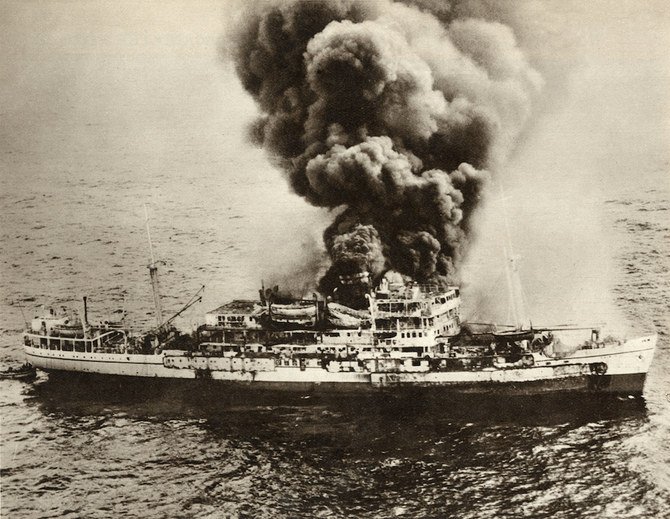LONDON: During the night of April 8, 1961, 11-year-old Mohammed bin Rashid Al-Maktoum, the future ruler of Dubai, was awoken by the sound of a ferocious storm battering the royal palace.
As a child, he had heard the elders of his grandfather’s generation recall phenomenal storms of such savagery that they likened them to the Day of Judgement.
But, as Sheikh Mohammed wrote in his autobiography “My Story” in 2019, “I didn’t pay much heed to their prophetic, doom-laden words.”
That is until that April night in 1961 when “I found my bed in the middle of a full-blown storm, with windows slamming in the gale-force winds that were blowing through our family home … It seemed like the world was ending all around me, what some other cultures call the end of days.”
It was, he wrote, “the beginning of a seemingly endless night,” during which large numbers of his father’s subjects, many of them injured and rendered homeless by the storm, sought sanctuary at the palace.
Outside, Sheikh Mohammed recalled, “there was heavy destruction, with palm trees flying through the air like toys, many houses damaged or utterly destroyed, and fishing boats tossed into the streets of the city. Many families suffered death or injury that night.”
And then, just when it seemed that things could not get any worse, they did. Out on the storm-swept sea, dozens were losing their lives — not to nature’s fury, but at the hands of a ruthless human killer.
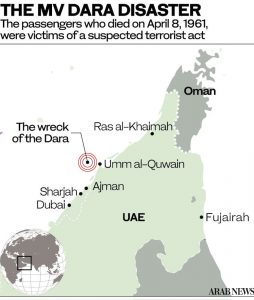
Dubai’s ruler Sheikh Rashid had organized men to go out into the streets to help where they could, and to help staff at Al-Maktoum Hospital cope with the waves of injured who were pouring in.
And then, recalled Sheikh Mohammed, “arrived news that froze my father where he stood. British soldiers rushed past the door, scarcely catching their breath. They shouted, ‘Your Highness! There’s a fire on the Dara!’ The world seemed to stand still.”
The MV Dara, a 120-meter, 5,000-ton ship was a familiar sight in Dubai and around the Gulf. Owned by the British India Steam Navigation Co., it was one of four similar ships that for the past decade or more had provided a regular service for cargo and passengers to and from Bombay (now Mumbai) via ports around the Gulf.
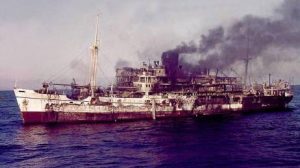
The Dara had left Mumbai on March 23 and, after calling at Karachi, Muscat, Dubai, Doha, Bahrain, Kuwait, Khorramshahr, Abadan and Basra, had returned to Dubai on April 7. On board were around 560 passengers and 132 crew.
The ship was anchored off the creek, with small boats ferrying passengers and cargo to and from the shore, when in the afternoon the weather began to deteriorate rapidly.
At about 5:30 p.m., after the Dara was clipped by a nearby cargo ship that had dragged its anchor in the rising seas, Capt. Charles Elson made the decision to put out to sea and ride out the storm in the relative safety of open water.
It was a fateful decision for the approximately 128 dock workers, officials, tradesmen and friends of passengers who had come aboard in Dubai and were unable to disembark before the ship sailed away to weather the storm. In all, about 820 souls were on board that night.
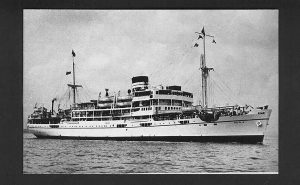
After the storm began to ease at about 4 a.m. the next morning, the Dara started its return to Dubai. She never made it.
Forty-three minutes later, a terrific explosion in an alleyway on the portside upper deck shook the ship.
“This explosion was of considerable violence,” reported the official inquiry into the tragedy, carried out in London in March and April 1962.
“It blew a semi-circular hole about 6ft wide and 4ft high in the engine-room casing, which separated the engine room from this alleyway; a rather larger hole was blown in the bulkhead on the port side; in the deck above there was a hole about 4ft in diameter … fire immediately broke out, there was heavy smoke; all electric power was cut off, the steering gear was put out of action and the pipes in the vicinity of the explosion were ruptured.”
Many passengers and even crew panicked, crowding into lifeboats “with a considerable quantity of luggage” even before the call came to abandon ship. Of the six lifeboats launched, two capsized with loss of life.
In “My Story,” Sheikh Mohammed painted a vivid picture of the horror that unfolded as nearby ships, Dubai fishermen and others rushed to the Dara’s aid.
“More than 800 passengers were on board the sinking ship,” he wrote. “The soldiers said that many were killed immediately, but more passengers were dying every minute as they crowded to escape — some crushed to death, others drowning in the raging waters.”
(Then) arrived news that froze my father where he stood. British soldiers rushed past the door, scarcely catching their breath. They shouted, ‘Your Highness! There’s a fire on the Dara!’ The world seemed to stand still.
Sheikh Mohammed bin Rashid Al-Maktoum
Overloaded lifeboats “were capsizing in the middle of the sea and the strong winds were scattering the boats in all directions.”
At the palace, “we gathered our relatives and a large number of Dubai residents in our home. My father sent all our family, without exception, with lifeboats to try to save anyone they could. We were able to rescue about 500 people that night — a night I thought would never end; one of horror, violence and terrible human tragedy.”
The crippled, burnt-out Dara stayed afloat for two more days before finally capsizing and sinking as she was towed back to Dubai. Today, she lies on her side about 8 km offshore.
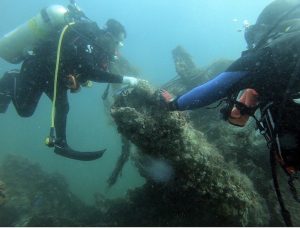
In interviews with this writer a decade ago, survivors and relatives of those who had been on the ship told of the horror of that night.
John Soares, then a 23-year-old deputy purser from Goa, recalled being thrown by the blast from his cabin bunk on the main deck. “I found total confusion on the deck,” he said. “I could see a gaping hole with fire coming out of it.”
Even as he tried to get passengers to put on lifejackets, many leapt into the rough seas without them.
“They were not listening to anybody, they were in a world of their own,” he said. “It was terrible, total panic.”
Decades after the tragedy, he remained haunted by the events of that night — the sight of many of those who jumped breaking their necks upon impact with the water, and the horror of witnessing mothers desperate to save their babies from the flames engulfing the ship, instead throwing them to certain death in the sea.
Many people in the region remain affected by the tragedy. Raja Qaiser of Islamabad, born 12 years after the sinking, recalled how his family still mourned its “lost children” — the four sisters Latifa, 17, Shoib, 7, Jamela, 5 and Hafeza, 3 months — who died on the ship with their mother Maqsood.
As a child, Qaiser would often hear his father Raja, who was not on the ship and who died in 1987 aged 70, speaking of his lost children. Until the end of his life, “he believed they had survived. He would not let anyone cry.”
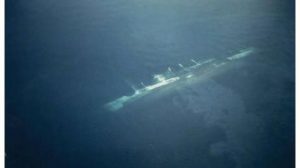
After the tragedy, which affected so many families around the Gulf, the hunt began for what caused the blast.
In 1957, Britain had intervened in an increasingly bitter war between the sultan of Oman and rebel tribespeople. The conflict reached a turning point in 1959 when British special forces and RAF bombers delivered a series of decisive blows against the rebels, in what became known as the Jebel Akhdar War.
The uprising had been crushed, but for a while insurgents continued to plant landmines in Oman, hitting military and civilian vehicles.
In 1962, a special court convened in Britain under the terms of the 1894 Merchant Shipping Act considered the evidence for 15 days and concluded that an explosive — probably a landmine — had been “practically certainly, deliberately placed in the vessel by a person or persons unknown.”
Sir John Hobson, the solicitor general, told the inquiry that the explosion had been a “deliberate and wicked act” of sabotage, the work of Omani rebels.
The explosion, reported the inquiry, had caused “an instantaneous fire which spread with extreme rapidity.”
The deaths had resulted “partly from the explosion itself and partly from the extremely rapid spread of the fire, which asphyxiated an unknown number of persons and prevented the launching of the majority of the lifeboats.”
Evidence was given to the inquiry by British Royal Navy divers who had been sent down to examine the wreck of the Dara.
They had concluded that “there seemed little doubt that the explosion was caused by a high-explosive of approximately the type and quantity used in an anti-tank mine … detonated deliberately, probably by a detonator with a time device.”
No group claimed responsibility for the blast and no one was ever charged with having carried it out, but numerous suspects were arrested and interrogated by the British.



